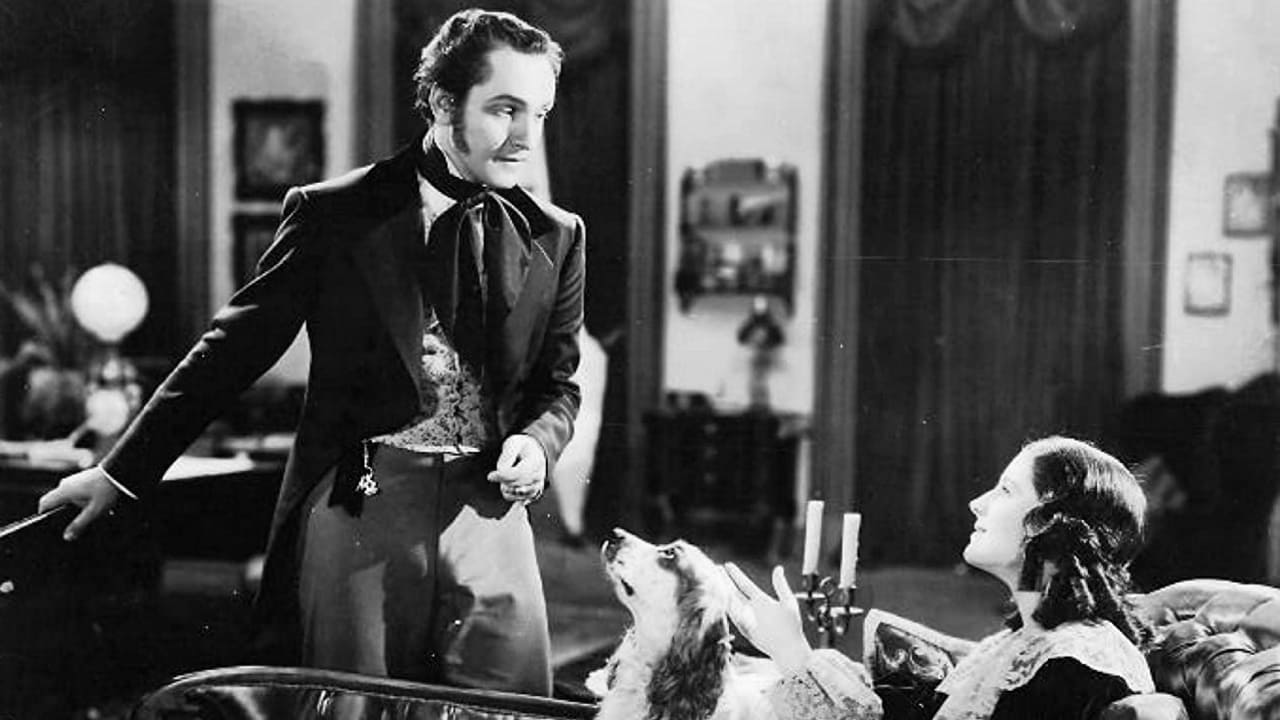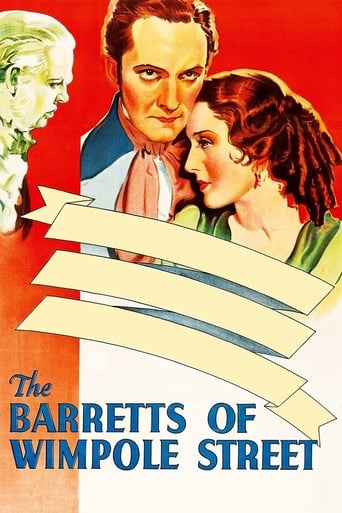

"The Baretts of Wimpole Street" released in 1934, has the stamp of MGM's great production values. Norma Schearer wonderfully plays Elizabeth Barrett, the invalid poet. She is overly protected by her father, brilliantly played by Charles Laughton. We later learn Laughton is really a tyrant of a man who is incapable of really loving anyone or being loved. Elizabeth meets the fellow poet Robert Browning (Frederic March), and they fall in love. Maureen O'Sullivan give one of her finest performances as Elizabeth's sister, who also falls in love with a Captain. Her father finds out and forbids her to see him again, in a cruel and heartbreaking scene where he makes her swear on a bible. The interplay between Laughton and O'Sullivan and Schearer is fascinating, as the family dynamics are brought to the foreground. "The Barretts of Wimpole Street" was originally a stage play, but translates just fine to the screen. The supporting case is top notch, but this is Norma Schearer's show. It is difficult to take your eyes off her. Laughton is great, as is O'Sullivan. Frederic March at times seems a bit off as Robert Browning, although he is very handsome and the chemistry between he and Schearer is credible. It is a shame that Norma Schearer left the movies by the 1940's. But we are fortunate that this gifted actress left such an amazing legacy of films - "The Barrets of Wimpole Street" is certainly one of them.
... View MoreThe Barrets Of Wimpole Street is a film based on rumours of poet Elizabeth Barrett's relationship with her father who allegedly abused her. As such the film makes for an interesting 'gossip column' type of story found in celebrity magazines. This of course does not trivialise the serious nature of abuse.What is most interesting in The Barretts Of Wimpole Street is that the nature of abuse -which takes on an incestuous form, - and the fact that it is conveyed through the image of the great Charles Laughton who is far from abundant in classic film star good looks. Therefore, in this instance abusive parents are depicted with a certain image which lacks favourable features. If a more glamorous cinema idol had played the part of Edward Moulton-Browing, perceptions of abuse could become distorted even though looks are irrelevant to abusive behaviour.It is also ironic that the abused Elizabeth Barrett's only opportunity to escape (at least it would appear that way) is via another controlling man. The difference is that Robert Browning wants (not totally motivated by altruistic reasons because he needs to fulfil his own emotional needs) the best for Elizabeth, whereas her completely selfish father only wants what's best for himself.The acting in this version of the Barretts Of Wimpole Street is of the highest calibre. This is especially for the three leads. While Laughton conveys his character Edward Moulton-Barret's abuse with a malicious menace that is extremely frightening, Norma Sheara is amazing as the abused Elizabeth Barret. Her face conveys such helplessness of a woman trapped, not only by her physical condition and environment, but by the psychological anguish of a woman torn between her abusive father and the importance of her own well being. Indeed Edward Moulton-Barrett's children have learnt to receive their Father's approval via abuse. In addition to conveying her anguish, Shearer illustrates that she is adept at illustrating the poetic Elizabeth when she interacts with Fredric March through her delivery of lines. This is reciprocated by March's efforts who is equally poetic in his highly animated delivery of lines.The supporting cast all give tremendous performances, especially that of Maureen O'Sullivan. She plays the naive, younger sister Henrietta to her stolid older sibling Elizabeth. Comic relief comes from Una O'Conner as Elizabeth's loyal maid Wilson, and Marion Clayton Anderson as the scatty cousin Bella. Also good is canine acting from Flush the dog, who slinks into his basket right on cue at the mere sight of Charles Laughton's character Edward Moulton-Barrett. This film adaptation of The Barrets Of Wimpole Street is cleverly adapted from the stage, and is one of the best of its era.
... View MoreThe Barretts of Wimpole Street was the most successful play written by Rudolph Besier and ran almost an entire year on Broadway in 1931. It starred Katherine Cornell as Elizabeth Barrett and featured Brian Aherne as Robert Browning and Charles Waldron as Edward Moulton Barrett. Though Norma Shearer gives one of her best performances as Elizabeth Barrett it might have been nice to see Kit Cornell do this. But as we well know, she like the Lunts disdained film for the legitimate stage.Elizabeth Barrett was indeed a woman of poor health though it surely did not impair her literary output. In 1845 Robert Browning after corresponding with her for some time did on impulse come to meet her and eventually they did run off to Italy and marry. Much to the considerable objection of her father.Whether Edward Moulton Barrett was as tyrannical and lascivious as Charles Laughton portrays him is open to debate and interpretation. Laughton plays him in much the same way he played Inspector Javert a year later in Les Miserables. Firm and unbending and inhuman with only a book of rules to guide his conduct. It may have been the author's dramatic license, but it surely does explain his opposition.On the other hand, he might have thought Robert Browning a deadbeat who couldn't make a living at the poetry gig. But the former makes a more interesting story.Fredric March is fine as the dashing literate Victorian gentleman that was Robert Browning. In the rest of the cast I did particularly like Marie Clayton as Laughton's dizzy niece with a lisp who Elizabeth for all her literary accomplishments envies.The Barretts of Wimpole Street is one classic piece of cinema from MGM during the height of their Tiffany period.
... View MoreThe beautiful Canadian actress Norma Shearer starred in this tense and unusual love story based on the true-life romance of Elizabeth Barrett and the poet Robert Browning. Charles Laughton's performance as her possessive and pathologically jealous father was one of the finest in his outstanding career. Although incest was the film's unspoken subtext, contemporary sensitivities prevented it from being spelt-out. That was not to deter Laughton who famously remarked that though they could prevent him from speaking of it, they could not censor the glint in his eye! An outstanding film.
... View More